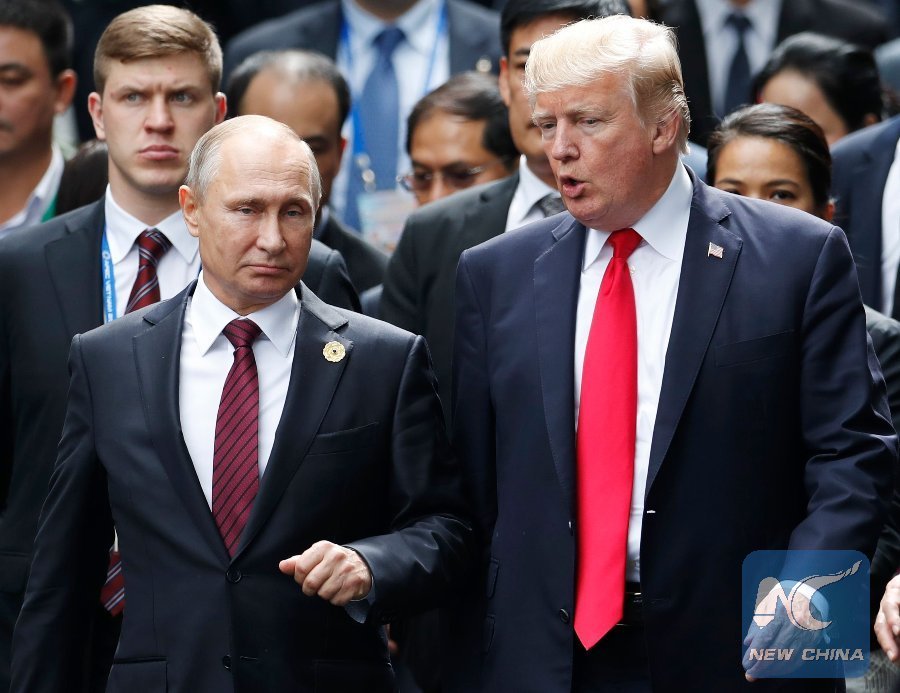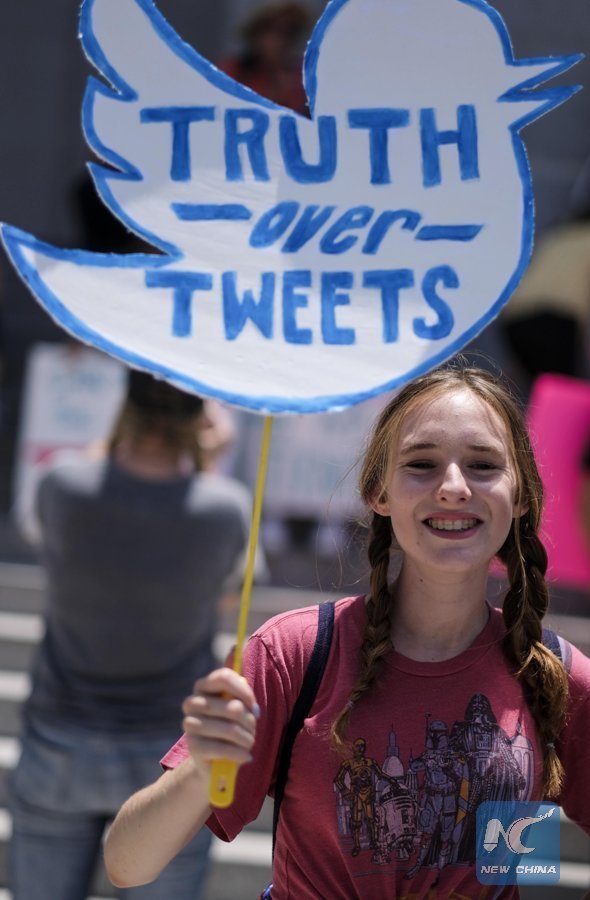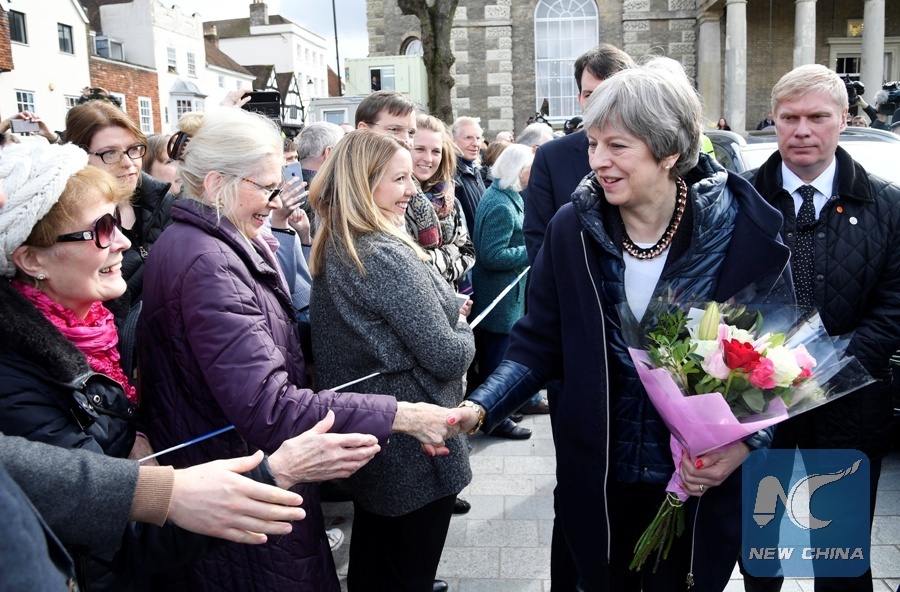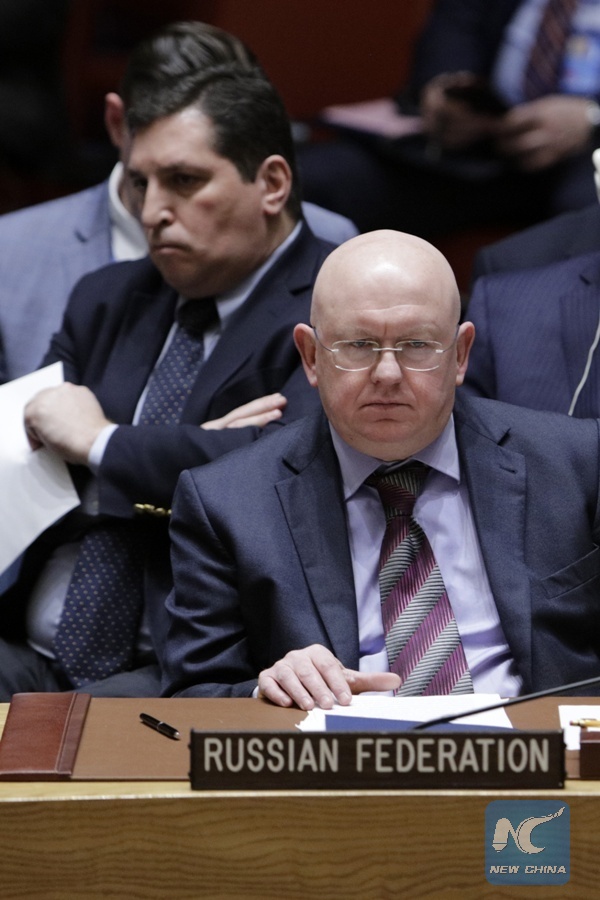
In this file photo taken on Nov. 11, 2017, U.S. President Donald Trump (R) and Russia's President Vladimir Putin talk as they make their way to take the "family photo" during the Asia-Pacific Economic Cooperation (APEC) leaders' summit in the central Vietnamese city of Danang. (Xinhua/AFP)
WASHINGTON, March 15 (Xinhua) -- The United States on Thursday announced more sanctions on Russia for its alleged interference in the 2016 U.S. election and "malicious" cyber attacks, as the row between the West and Moscow has been escalating over the poisoning of a former Russian double agent in Britain.
In an announcement, the U.S. Treasury Department said five entities and 19 individuals were designated under the Countering America's Adversaries Through Sanctions Act as well as Executive Order 13694.
Treasury Secretary Steven Mnuchin said "the administration is confronting and countering malign Russian cyber activity, including their attempted interference in U.S. elections, destructive cyber attacks, and intrusions targeting critical infrastructure."
"These targeted sanctions are a part of a broader effort to address the ongoing nefarious attacks emanating from Russia," he said, adding that the Treasury intends to impose additional sanctions.
Washington has been accusing Russia of interference in the 2016 presidential election and involvement in hacker attacks against the United States, both of which have been denied by Moscow.

A girl holding a placard participates in the March for Truth rally in Los Angeles, the United States, on June 3, 2017. Rallies and marches took place across the country to call for investigation into possible Russian interference in the U.S. election and the links between Donald Trump's administration and Russia. (Xinhua/Zhao Hanrong)
According to the Treasury, Russia's "continuing destabilizing" activities included the reported conduction of "destructive" cyber attacks like the NotPetya attack, which it said should attributed to the Russian military and was "the most destructive and costly cyber attack in history."
It also said that since at least March 2016, Russian "government cyber actors" have targeted U.S. government entities and multiple critical infrastructure sectors, including the energy, nuclear, commercial facilities, water, aviation, and critical manufacturing sectors.
Some of the sanctioned entities and individuals were accused of being related to Russia's Internet Research Agency LLC (IRA), which the U.S. Treasury said has "tampered with, altered, or caused a misappropriation of information" to interfere with the 2016 U.S. election.
"The IRA created and managed a vast number of fake online personas that posed as legitimate U.S. persons," it said. "Through this activity, the IRA posted thousands of ads that reached millions of people online."
The Treasury also accused the IRA of having organized and coordinated political rallies during the run-up to the U.S. 2016 election, all while hiding its Russian identity.
"Further, the IRA unlawfully utilized personally identifiable information from U.S. persons to open financial accounts to help fund IRA operations," it said.
It said that Russia was behind the recent use of a military-grade nerve agent to "murder" two British citizens, but Moscow denied its involvement in the incident.
The Donald Trump administration has sanctioned more than 100 individuals and entities under the Treasury's Ukraine and Russia-related sanctions authorities, including 21 individuals, nine entities, and 12 subsidiaries that are owned 50 percent or more by previously sanctioned Russian companies on Jan. 26, according to the Treasury.
As a result of Thursday's sanctions, all property and interests in property of the designated persons subject to U.S. jurisdiction would be blocked, and U.S. persons were generally prohibited from engaging in transactions with them.
Earlier on Thursday, leaders of the United States, France, Germany, and Britain issued a joint statement on the poisoning attack in Britain, saying that "the use of a military-grade nerve agent, of a type developed by Russia, constitutes the first offensive use of a nerve agent in Europe since the Second World War."

Britain's Prime Minister Theresa May (2R) meets members of the public during her visit to Salisbury, southern England, on March 15, 2018, where she visited the areas where former Russian double agent Sergei Skripal and his daughter Yulia went to, and were discovered at, following an apparent nerve agent attack on March 4. (Xinhua/AFP)
The four nations said Russia's activity "threatens the security of us all," adding there is "no plausible alternative explanation."
The four nations called on Russia to address all questions related to the attack and in particular, to provide "full and complete" disclosure of the Novichok program to the Organisation for the Prohibition of Chemical Weapons.
Former Russian double agent Sergei Skripal, 66, and his daughter Yulia, 33, are in a critical condition in hospital after being exposed to a nerve agent on March 4.
Skripal and his daughter, remaining in a critical but stable condition, had been found collapsed on a bench in London.
On Wednesday, May announced that her government would expel 23 Russian diplomats and told them to leave within a week.
She added that all high-level bilateral contacts with Russia will be canceled, and no members of the British royal family or government ministers will attend the World Cup to be hosted by Russia.
In response, the Russian government denied any involvement in the attack, and threatened "response measures" against London if measures are taken by the British government.
Russian Ambassador to the United Nations Vassily Nebenzia said on the same day that Britain's allegations were "completely unacceptable" and "unjustified."

Russian Ambassador to the United Nations Vassily Nebenzia (Front) attends a Security Council emergency meeting regarding accusations of the use of a nerve agent in the United Kingdom at the United Nations headquarters in New York, on March 14, 2018. (Xinhua/Li Muzi)
"We demand that material proof be provided of the allegedly found Russian trace in this high-resonance event. Without this, stating that there is incontrovertible truth is not something that we can take into account," he added.

